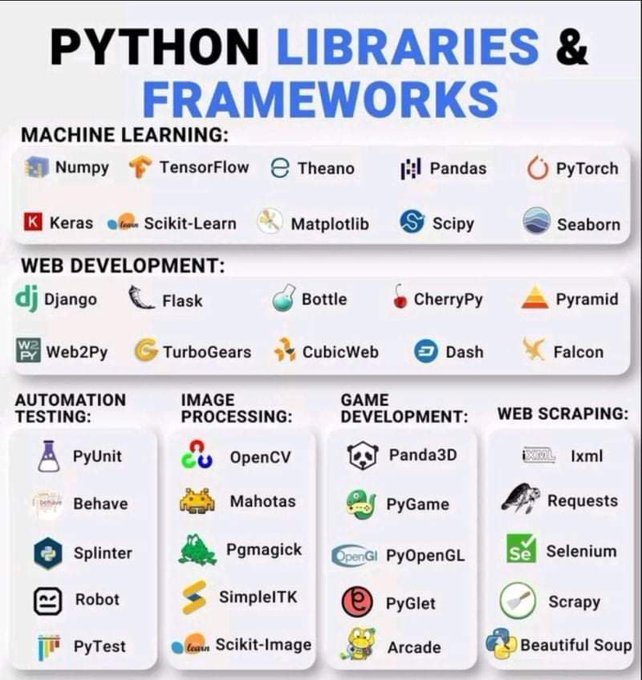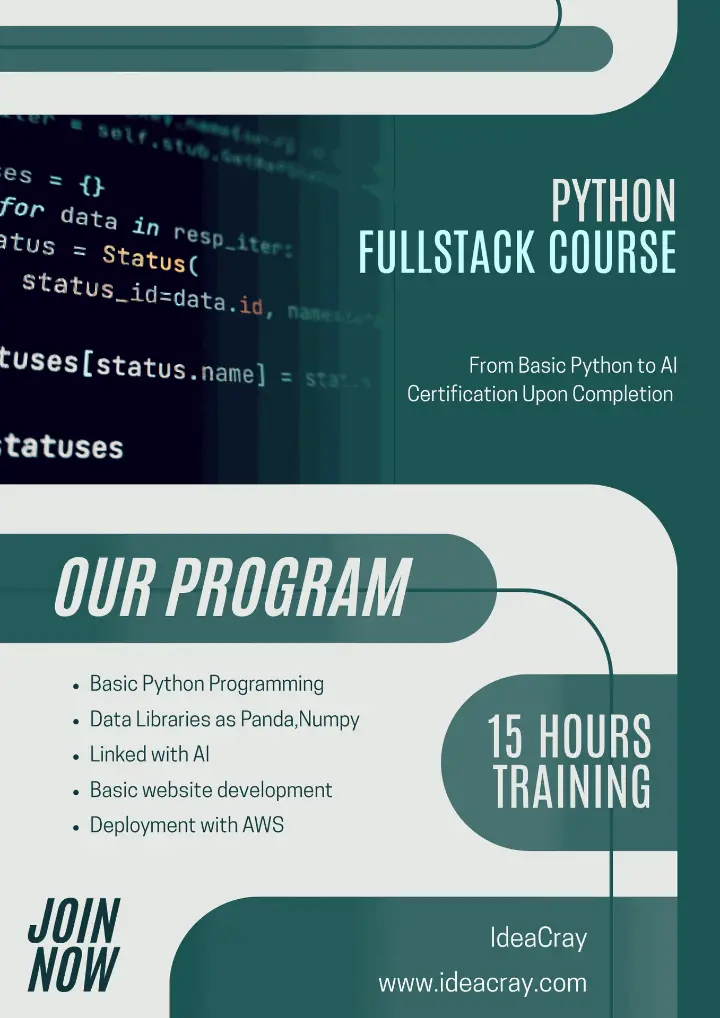Master Python Fullstack Development with Our Comprehensive Bootcamp!
USP and Benefits
By enrolling, you will gain:
- Full-Stack + AI Mastery: Python basics (data types, functions, OOP, error handling) to advanced frameworks (Django/Masonite), RESTful APIs, modern frontends; plus OpenAI integration for smart chat apps, image recognition, and automation.
- Real-World Projects: Build 3-5 deployable portfolio pieces: AI-powered content management system, data analysis platform (crawling to insights), custom AI assistant, and personal project using live data/APIs.
- Key Extensions:
- Build functional Discord bots (simple to advanced commands).
- Data handling with NumPy, Pandas, JSON.
- Foundations of machine learning and deep learning for predictive tools.
Flexible Structure:
- Lite Version: 3 months online (2 hours/week, 12 sessions, 24 hours total) → Attendance Certificate.
- Regular Version: 1-day offline bootcamp + 3 months online + 1-2 day project offline → Attendance + Completion Certificate (with project).
- Hybrid: Online (mostly English) + Offline (Chinese).
In 90 days, you will reach one (or more) of the following life stages:
- Full-end/back-end engineer with a monthly salary of HK$28,000–45,000 (Hong Kong + remote work)
- Independent freelance work in US dollars, USD$800–3,000 per job (frequent client of Upwork and Fiverr)
- Have a portfolio of 3-5 real-world projects that are ready to be deployed and can be added to your resume.
- Able to deploy a website to AWS with a single click, demonstrating this in an interview will instantly outshine your competitors.
- From "complete zeros" to a Laravel/Python full-platform developer sought after by companies
- 87% of graduates successfully changed jobs or started taking on projects within 3 months of graduation (statistics for the 2023–2025 cohort).
In short: "This isn't a class; this is a shortcut to doubling your salary by 2026."
Why Choose Our Python Fullstack Bootcamp?
- Hands-On Learning: Build real-world projects, including a Discord bot and fullstack applications.
- Expert Mentorship: Learn from industry professionals with practical insights.
- Flexible Structure: Combine offline workshops and online sessions for a tailored learning experience.
- Certification: Earn an Attendance Certificate and, upon project completion, a Certificate of Completion (if eligible).
- Professional Skills: Proficient in the Python Django framework, AWS deployment, and have a basic understanding of machine learning and deep learning.
This course is perfect for:
- Absolute beginners: Curious about coding/AI but starting from scratch.
- Career switchers: Moving to Python/full-stack/backend or entry data analyst roles.
- Entrepreneurs/Freelancers: Build sites/tools and monetize on Upwork/Fiverr.
- AI/Data Enthusiasts: Hands-on with bots, ML, and analysis.
- Students/Young Pros: Early portfolio for future-proof jobs.
- Busy Professionals: Flexible hybrid schedule.
Mentor Team

Timothy Wai
Over 30 years of experience teaching IT and programming, as well as being a professional full-stack web consultant and AI expert, providing IT training for multiple companies and different countries in Singapore.

Bruno Wong
Started entrepreneurship in high school and taught programming during the pandemic, helping over 300 students learn and become Python Developers and Fullstack Developers. In the age of AI, I hope to help more people increase their competitiveness!
Program Breakdown
Python Fullstack Bootcamp (1-2 Days, 2-3 Hours)
- Explore What Python Can Do
- Learn Python Basics: Data and Data Types
- Master If-Else Statements
- Understand Functions
- Recap Python’s Capabilities and Understand Libraries
- Dive into Object-Oriented Programming (OOP)
- Learn File Handling and Try-Except Error Handling
- Get a Project Overview
Online intensive training (3 months, 2 hours per session, total of 24 hours)
12 Online Sessions:
- Review Python Fundamentals
- Building applications with Django
- Learn Website Deployment in AWS and Review Project Overview
Course Extension Offline Training
- Data Analysis Course Content - Numpy, JSON, pandas
- Get a Basic Introduction to Machine Learning and Deep Learning
- Learning Discord.py Bots and Setting Up GUI with Tkinter
Our Mission
We’re committed to empowering aspiring developers with the skills to create modern, scalable applications and explore the exciting world of AI. Whether you're a beginner or advancing your skills, our Python Fullstack Bootcamp prepares you to excel in the tech industry.
Limited-Time Offer
💸 Enroll Now and start your journey to becoming a Python Fullstack Developer!
Course Registration Format:
Regular Version
- In-person short-term training: 1 day, 3 hours each session
- 3-month course: 2 hours each time, a total of 12 online classes
- You can obtain a course certificate by completing all course hours.
Premium Version
- In-person short-term training: 1 day, 3 hours each session
- 3-month course: 2 hours each time, a total of 12 online classes
- Course Extension Section
- You can obtain a course certificate by completing all course hours.
- Obtain a completion certificate and finish the assignment
Frequently Asked Questions
What is the format of the class for the course?
We will first conduct the training online, followed by intensive online training, and finally complete the exercises or projects in an offline format.
What support does the course provide?
Provides an online learning platform and learning community, where you can also ask questions in the community at that time.
Will I find a job?
We cannot guarantee that everyone will find a job 100%, but we will provide relevant information and encourage everyone to pursue interviews for related jobs, as well as to engage in freelance work to earn more income.
What language is the course conducted in?
We will primarily use Chinese and English, with English being the main language online and Chinese as a secondary language; for offline, Chinese will be the main language and English will be secondary.
Is it possible to have additional one-on-one tutoring?
If students need, they can inquire individually with the teacher.
What career paths can learning Python lead to?
Python can be applied to tasks such as website development, data analysis, and artificial intelligence architecture. If you want to work in AI or network-related fields, you need to learn Python!
How to choose between Python full-stack and PHP full-stack courses?
- Select Python: If you have a strong interest in data analysis, AI applications, scientific computing, or entering major tech companies, Python is the standard language in these fields.
- Select PHP: If you want to quickly enter development jobs related to local small and medium-sized enterprises, e-commerce, and WordPress in Hong Kong, PHP is still the mainstream choice. Both can lead to becoming a full-stack developer, but their ecosystems and application scenarios differ.
Is three months really enough time?
Our course design has been validated, and the key is to "focus on practical application and eliminate redundancy." We do not teach unnecessary syntax details; instead, we center our instruction around four core projects. As long as you keep up with the weekly 2-hour learning pace and engage with the training and materials on the learning platform, you can definitely learn programming!
What happens if you don’t enroll—or keep hesitating?
- Missing rare Web + AI combo: Few courses offer this—delaying leads to slow, fragmented learning and falling behind trends.
- No professional portfolio: Without guided projects/AWS skills, resumes lack proof, hurting interviews.
- Incomplete skills: Skip extensions like Discord bots/ML/data tools, limiting freelance/high-value opportunities.
- Lost job/gig edges: No certs/portfolio means outcompeted, stagnant salary.
- Inefficient solo learning: Easy to get stuck without mentors/community.
- Higher future costs: Separate courses later waste more time/money.
In short: Enroll now to fast-track 2025's hottest Python skills (with Discord bot, data analysis, and ML extensions) in just 3 months—transform into a high-demand developer and unlock new career/income paths!

